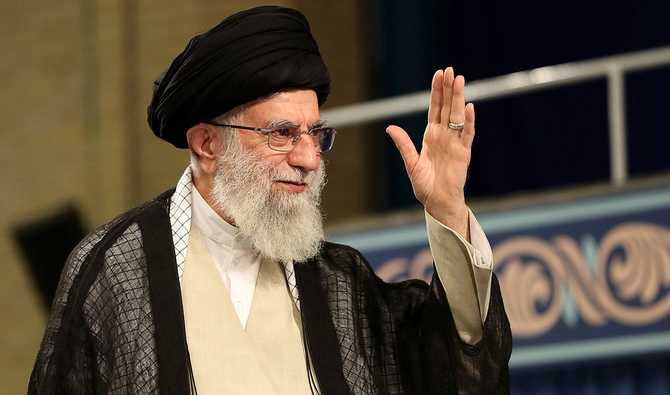The balance of power between Iran and Israel
When it comes to confronting the Iranian regime, without a doubt Israel has been fortunate in the past four years. The Trump administration’s Iranian policy has been in alignment with Israel’s objectives.
The maximum pressure policy served Israel’s interests as it significantly weakened the theocratic establishment of Iran on several fronts. From the outset, the Israeli leaders were opposed to the Joint Comprehensive Plan of Action (JCPOA), commonly known as the Iran nuclear deal, and lobbied against it, partly due to the fact that it provided the ruling clerics of Iran with extra revenue. The main beneficiaries of the nuclear agreement were not the ordinary Iranian people, but the Islamic Revolutionary Guard Corps (IRGC), the Quds Force, the Office of the Supreme Leader Ayatollah Ali Khamenei, the regime’s loyalists and proxies and militia groups across the Middle East. Israel believed that the nuclear deal would empower and embolden its rivals, Hezbollah, Hamas, and the Syrian regime.
In addition, the nuclear deal paved the way for lifting sanctions against Tehran. As sanctions against Iran were lifted during the Obama administration, it quickly became clear that those actions gave Iran global legitimacy in the eyes of the international community. This newfound legitimacy and the lifting of sanctions generated billions of dollars in revenue for Iran’s military institutions — the IRGC and Iran’s militia and terror groups. As Israel suspected, Tehran used that influx of revenues to expand its influence throughout the region, including in Syria, Iraq, Yemen and Lebanon. And the expansion campaign proved to be immensely successful.
The balance of power was in Iran’s favor until the current administration assumed office. One of the first things that the Trump administration did was to pull the US out of the nuclear deal. This was a huge blow to the Iranian regime and a major victory for Israel. A year into the pressure, the state-controlled Syrian newspaper Al-Watan reported that Iran had halted its credit line to the Syrian government. Some of Iran’s authorities publicly announced that they also did not have money to pay their mercenaries abroad.
In an interview with the state-run Ofogh Television Network, for instance, Parviz Fattah, the current head of the Foundation for the Underprivileged (Mostazafan Foundation) stated: “I was at the IRGC Cooperative Foundation. Haj Qassem (Soleimani, commander of the IRGC Quds Force who was killed by a US drone strike) came and told me he did not have money to pay the salaries of the Fatemiyoun (Afghan mercenaries). He said that they were our Afghan brothers, and he asked for help from people like us.”
Israel is concerned that the balance of power is going to shift in favor of Iran when the Biden administration takes over.
Dr. Majid Rafizadeh
Furthermore, Tehran’s diminishing resources also caused Iranian leaders to cut funds to the Palestinian group Hamas and the Lebanese militant group Hezbollah. Hamas was forced to introduce “austerity plans” while Hassan Nasrallah, the leader of Iran’s proxy, Hezbollah, also called on his group’s fundraising arm “to provide the opportunity for jihad with money and also to help with this ongoing battle.”
Israel scored another victory as Iran’s domestic economic situation became so dire that the Iranian President Hassan Rouhani admitted that the regime was encountering the worst economic crisis since its establishment in 1979. The political deputy of the province of Bushehr, Gov. Majid Khorshidi, told a gathering on July 14 that they should not ignore US sanctions. “We used to see this approach (of ignoring US sanctions) from the previous (Ahmadinejad) administration and unfortunately it still continues,” he said. “But I have to say that sanctions have broken the economy’s back.”
Iran’s currency, the rial, has been in free fall for the past three years as well. As of Nov. 19, 2020, a US dollar is worth approximately 250,000 rials. Before the current US administration imposed a “maximum pressure” policy against Tehran, a US dollar equaled nearly 30,000 rials. During the past year, Iran’s oil exports also have sunk to a record low. The country’s budget relies heavily on selling oil.
The balance of power shifted to such an extent in favor of Israel that it was empowered to directly inflict several blows on the Iranian regime during the past few years. This week, for example, the Israeli air force conducted airstrikes against eight targets and storage facilities reportedly controlled by the Iranian Quds forces and the Syrian regime forces stationed in Syria.
In 2019, Israel launched cruise missiles toward Iranian and Syrian military positions near the Syrian capital, Damascus. In August and November 2019, the Israel Defense Forces (IDF) struck dozens of Iranian targets in Syria, and they carried out a series of airstrikes in northern Baghdad a few months ago. According to reports, several Iranians were killed and wounded in these airstrikes. The Iranian regime, which is known for immediate retaliation, remained silent due to its weakened position. The only response which came out of Tehran was heightened rhetoric.
But now, Israel is concerned that the balance of power is going to shift in favor of Iran when the Biden administration takes over.
In summary, while Israel has been fortunate during the Trump administration when it comes to confronting and weakening the Iranian regime, the balance of power between Israel and Iran may indeed shift in favor of Iran in the next US administration.
The views expressed in this article do not necessarily reflect the views and editorial stance of the SOHR.
Source: The balance of power between Iran and Israel | Arab News

